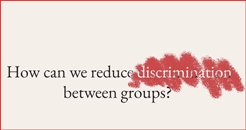 Reducing discrimination between groups
Reducing discrimination between groups
From an article from Behavioral Scientist
How can we reduce discrimination between groups in conflict?
Research shows that 'shared identity' can help bridge divides. Two experiments show this. The first explored whether imposing an arbitrary shared identity i.e. Team Leopards or Team Tigers can mitigate biased reactions to participants of different races. The second examined the same question among Christian and Muslim players in an Iraqi soccer league.
Throughout history, some of the earliest instances of human identity were tribal in nature. Housed in close-knit communities, people found comfort and safety by banding together in coalitions of people who shared their identities, values, and goals. In today's complex societies, many people gravitate, often unconsciously, towards people of the same race. But can these racial biases be overcome? Could something greater - perhaps an overarching, more inclusive identity takes their place?
One summer, some scientists decided to put this to the test. They randomly assigned volunteers who identified as white to one of two groups - Team Leopards or Team Tigers. The volunteers were shown photos of the members of both teams and learned that they included people of different races. Their own team included six black and six white individuals as did the other team.
Having memorized who was on each team, participants were shown the photos again while they were inside a brain scanner to gauge whether their new team identity affected their brain activity. Their responses were truly intriguing. While previous research had observed racial biases in brain activity, these participants' brain responses closely reflected their new Leopard or Tiger identities rather than their race. They also asked people to rate their opinions about each face that they saw, and people felt more positively toward in-group member faces - their own team rather than members of the out-group.
Our brains are far from being wired for racism, rather they seem designed to adopt social identities that can either reinforce or breakdown this prejudice in favour of new identities.
Can this kind of finding could move from a lab to the real world where it really matters? Can cross-cutting identities be used to produce more intergroup harmony in the real world?
In 2014, in northern Iraq, ISIS left many people stranded from their homes and living in refugee camps, especially Christian minorities. An experiment was run to see if shared identities could help bridge together these torn communities. People were assigned to teams in a soccer league, but some Muslim-dominated teams had three Christians and some Christian-dominated teams had three Muslim players assigned to their team.
By the end of the season, people who had been exposed to people from another religion on their soccer team were much more open-minded and embraced people from these other religions. For example, they were willing to nominate people from another religion to win a sportsmanship prize and they wanted to do it again and play in an inter-religious soccer team the following year.
It was also found that the teams that were most successful were the ones who were most inspired to do this. The fact is that these individuals shared a common interest and passion for soccer. And soccer provided a platform for bringing people together because it involves cooperation, competition against other teams, coordination, and relatively equal status. These are the key ingredients for bridging divides and people bringing people back together.
Bias doesn't just exist in the heads of individuals but resides in the social structures and the institutions that run our societies. It's embedded in how things work.
This research provides three clear lessons:
-
The first is that creating a shared identity can help bring people together, even under the most extraordinary and tragic of circumstances like in northern Iraq.
-
In society, we have institutions that pit us against one another or create inequalities that make it hard for people to stay as part of a common identity.
-
People are not hardwired to be racist, or anti-religious bigots. We are hardwired to be groupish.
When we create institutions and opportunities for people to come together in society, we have to be mindful that we can leverage the above research to bring us together and help build more cohesive, harmonious societies.
Watch this 3 minute video:
Retweet about this article:
From an article from Behavioral Scientist, 15/11/2022